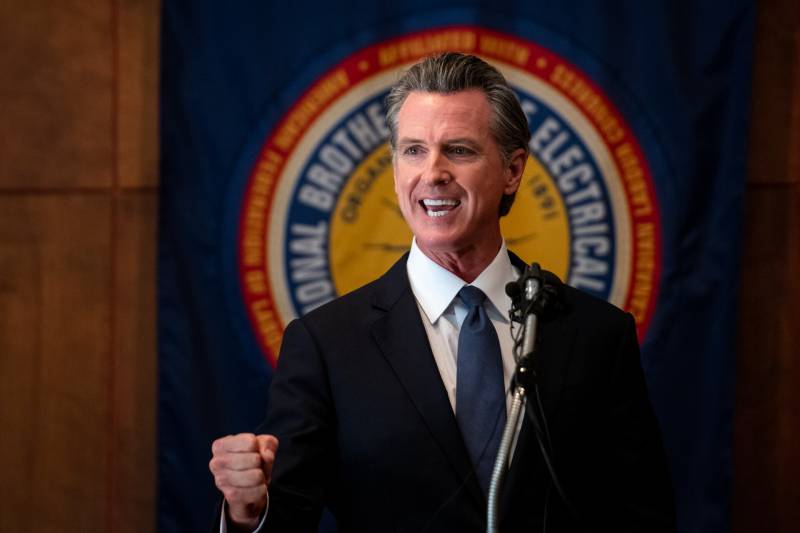But perhaps as a carrot for lawmakers, Newsom’s proposal also includes other help for struggling Californians. He’s asking lawmakers to expand the emergency rental assistance program created during the pandemic by $2.7 billion; put $1.4 billion toward unpaid utility bills and $750 million to make public transit free for three months; and provide $1,500 stipends to health care workers as an incentive to stick with their jobs in hospitals and nursing homes.
In making his pitch, Newsom noted that California coffers continue to swell — despite inflation and pandemic-induced economic contractions — because of the state’s progressive tax structure, which relies heavily on capital gains taxes from wealthy residents. He said that nearly 10% of income taxes next year will come from capital gains — similar to the percentage in 2000, just before the stock market crashed and the state had to make deep cuts to programs like schools and social services.
“The question is, what would they have done in the state of California … knowing what was going to come in late 2000, 2001, 2002, 2003? If they knew the economic realities, the macroeconomic realities of the markets and the volatility that was going to ensue and all the cuts that had to come from that?” Newsom said. “And so we’ve been very mindful of that.”
Expanding access to abortion services
As part of that one-time spending, Newsom took aim at Republican leaders in other states that are working to ban abortion access and curb LGBTQ+ rights. He wants to spend $125 million of the budget surplus on expanding access to abortion services, including for people who will come here from other states. The largest chunk of that money — $40 million — would be handed out as grants to health care providers to offset the costs of abortions for lower- and middle-income people.
He framed California as the truly abortion-rights state.
“I think there’s a lot of folks out there that, you know, that are pro-conception to birth. But they fall wholly short of being pro-life,” he said. “Because if you’re pro-life, you’d support prenatal care. You’d support infant health, you’d support child care and preschool. If you’re pro-life, you’d believe in science. You’d believe in climate change … you’d actually support commonsense gun safety. You would be expanding after-school and preschool programs.”
Newsom’s also trying to appeal to businesses located in states like Texas and Florida that have passed homophobic and transphobic laws. His administration will give “additional consideration to companies that relocate from states that have enacted anti-LGBTQ+ and reproductive rights laws,” if they apply for the state’s CalCompetes Tax Credit, he said.
Among the other increased investments Newsom highlighted Friday:
- $19 billion more than his January proposal for public schools — money that will help offset declining enrollment and provide flexible block grants to districts.
- Nearly $300 million in new funds for children’s mental health screening and services, including suicide response and prevention.
- $193 million in new money for public safety, including money for a fentanyl task force at the attorney general’s office and for cracking down on cartel fentanyl trafficking at the southern border.
- Nearly $3 billion in new money to combat homelessness, including $700 million for crisis response and interim housing and $65 million to build his proposed new CARE courts.
- $9.5 billion in new money for climate resilience, totaling $47 billion over two years — that total includes $7.2 billion for drought resilience, some earmarked for farmers.
As happens every year, Newsom’s May proposal is really the starting point for negotiations with lawmakers. San Francisco Democrat Phil Ting, who chairs the Assembly Budget Committee, said lawmakers will be pushing back on Newsom’s plan to send cash to car owners.
“I think we’re looking at potentially a straight cash rebate going to people who really have been hit the hardest — people who need it the most,” Ting said.
As for infrastructure, Ting says one need stands above the rest: housing.
“And so I think one of the best things we could do for our economy, but also for our state, is give money to affordable housing that is ready to be built right now,” Ting said.
And not all Democratic lawmakers support using a large portion of the budget surplus on one-time rebates and expenditures to temporarily offset the impact of inflation.
State Sen. Scott Wiener, D-San Francisco, says Newsom and the Legislature should use the state’s extraordinary surplus to address long-term problems facing California.
“We have so many needs in the state and we have so many one-time expenditures we could make to shore up our infrastructure and make people’s lives better, not just for a month or two, which is what a rebate would do, but to make people’s lives better for decades to come,” Wiener said.

